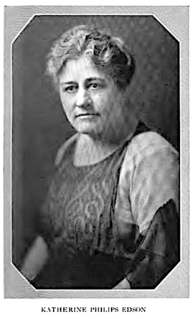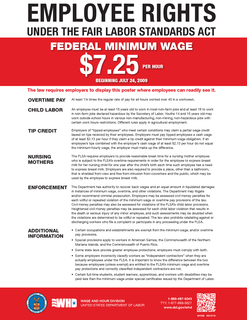Wage slavery is a term used to draw an analogy between slavery and wage labor by focusing on similarities between owning and renting a person. It is usually used to refer to a situation where a person's livelihood depends on wages or a salary, especially when the dependence is total and immediate.
Collective bargaining is a process of negotiation between employers and a group of employees aimed at agreements to regulate working salaries, working conditions, benefits, and other aspects of workers' compensation and rights for workers. The interests of the employees are commonly presented by representatives of a trade union to which the employees belong. The collective agreements reached by these negotiations usually set out wage scales, working hours, training, health and safety, overtime, grievance mechanisms, and rights to participate in workplace or company affairs.
Overtime is the amount of time someone works beyond normal working hours. The term is also used for the pay received for this time. Normal hours may be determined in several ways:

The National Recovery Administration (NRA) was a prime New Deal agency established by U.S. president Franklin D. Roosevelt (FDR) in 1933. The goal was to eliminate "cut-throat competition" by bringing industry, labor, and government together to create codes of "fair practices" and set prices. The NRA was created by the National Industrial Recovery Act (NIRA) and allowed industries to get together and write "codes of fair competition." The codes were intended to reduce "destructive competition" and to help workers by setting minimum wages and maximum weekly hours, as well as minimum prices at which products could be sold. The NRA also had a two-year renewal charter and was set to expire in June 1935 if not renewed.
Brady disclosure consists of exculpatory or impeaching information and evidence that is material to the guilt or innocence or to the punishment of a defendant. The term comes from the 1963 U.S. Supreme Court case Brady v. Maryland, in which the Supreme Court ruled that suppression by the prosecution of evidence favorable to a defendant who has requested it violates due process.

United States labor law sets the rights and duties for employees, labor unions, and employers in the United States. Labor law's basic aim is to remedy the "inequality of bargaining power" between employees and employers, especially employers "organized in the corporate or other forms of ownership association". Over the 20th century, federal law created minimum social and economic rights, and encouraged state laws to go beyond the minimum to favor employees. The Fair Labor Standards Act of 1938 requires a federal minimum wage, currently $7.25 but higher in 28 states, and discourages working weeks over 40 hours through time-and-a-half overtime pay. There are no federal or state laws requiring paid holidays or paid family leave: the Family and Medical Leave Act of 1993 creates a limited right to 12 weeks of unpaid leave in larger employers. There is no automatic right to an occupational pension beyond federally guaranteed social security, but the Employee Retirement Income Security Act of 1974 requires standards of prudent management and good governance if employers agree to provide pensions, health plans or other benefits. The Occupational Safety and Health Act of 1970 requires employees have a safe system of work.

Katherine Philips Edson was an American reformer and social activist who had a key role in changing the labor conditions in California and across the nation.

In contract law, a non-compete clause, or covenant not to compete (CNC), is a clause under which one party agrees not to enter into or start a similar profession or trade in competition against another party. Some courts refer to these as "restrictive covenants." As a contract provision, a CNC is bound by traditional contract requirements including the consideration doctrine.

The Oregon Bureau of Labor and Industries (BOLI) is an agency in the executive branch of the government of the U.S. state of Oregon. It is headed by the Commissioner of Labor and Industries, a nonpartisan, statewide elective office. The term of office is four years. The current Commissioner is Val Hoyle.

The minimum wage in the United States is set by US labor law and a range of state and local laws. Employers generally have to pay workers the highest minimum wage prescribed by federal, state, and local law. Since July 24, 2009, the federal government has mandated a nationwide minimum wage of $7.25 per hour. As of January 2018, there were 29 states with a minimum wage higher than the federal minimum. From 2017 to 2018, eight states increased their minimum wage levels through automatic adjustments, while increases in eleven other states occurred through referendum or legislative action.
A collective agreement, collective labour agreement (CLA) or collective bargaining agreement (CBA) is a written contract negotiated through collective bargaining for employees by one or more trade unions with the management of a company that regulates the terms and conditions of employees at work. This includes regulating the wages, benefits, and duties of the employees and the duties and responsibilities of the employer or employers and often includes rules for a dispute resolution process.

The Fair Labor Standards Act of 1938 29 U.S.C. § 203 (FLSA) is a United States labor law that creates the right to a minimum wage, and "time-and-a-half" overtime pay when people work over forty hours a week. It also prohibits most employment of minors in "oppressive child labor". It applies to employees engaged in interstate commerce or employed by an enterprise engaged in commerce or in the production of goods for commerce, unless the employer can claim an exemption from coverage.
The California Labor Code, more formally known as "the Labor Code", is a collection of civil law statutes for the State of California. The code is made up of statutes which govern the general obligations and rights of persons within the jurisdiction of the State of California.
The California Public Records Act was a law passed by the California State Legislature and signed by the governor in 1968 requiring inspection or disclosure of governmental records to the public upon request, unless exempted by law.
John Francis "Jack" Henning was a U.S. labor leader, civil servant, and a former U.S. Ambassador to New Zealand (1967–1969) and Under Secretary of Labor (1962–1967). Called "one of organized labor's greatest leaders" and "legendary" for his defense of labor, he is also credited with a positive role in the defense of minimum wage laws and civil rights.
A family wage is a wage that is sufficient to raise a family. This contrasts with a living wage, which is generally taken to mean a wage sufficient for a single individual to live on, but not necessarily sufficient to also support a family. As a stronger form of living wage, a family wage is likewise advocated by proponents of social justice. Family wage campaign was aiming to maintain the traditional family structure, as a concept connecting economics and family structure it is one of the examples of how economic structure of family, which is a subject of the field family economics, affects overall economy beyond the family.
A Berman hearing is a provision under California law for the administrative resolution of wage claims under the California Labor Commissioner in accordance with the provisions of the California Labor Code, §98. The hearing is named after Howard Berman, the member of the California State Assembly who instituted it.
The California Department of Industrial Relations (DIR) is a department of the government of the state of California which was initially created in 1927. It is currently part of the Cabinet-level California Labor and Workforce Development Agency. It is currently headquartered at the Elihu M. Harris State Office Building in Oakland.
The California Fair Employment Practices Act (FEPA) was a statute passed and enacted in 1959 that barred businesses and labor unions from discriminating against employees or job applicants based on their color, national origin, ancestry, religion, or race. Prior to being repealed and reenacted under the California Fair Employment and Housing Act in 1980 the law was codified under part 4.5 of the Labor Code.








